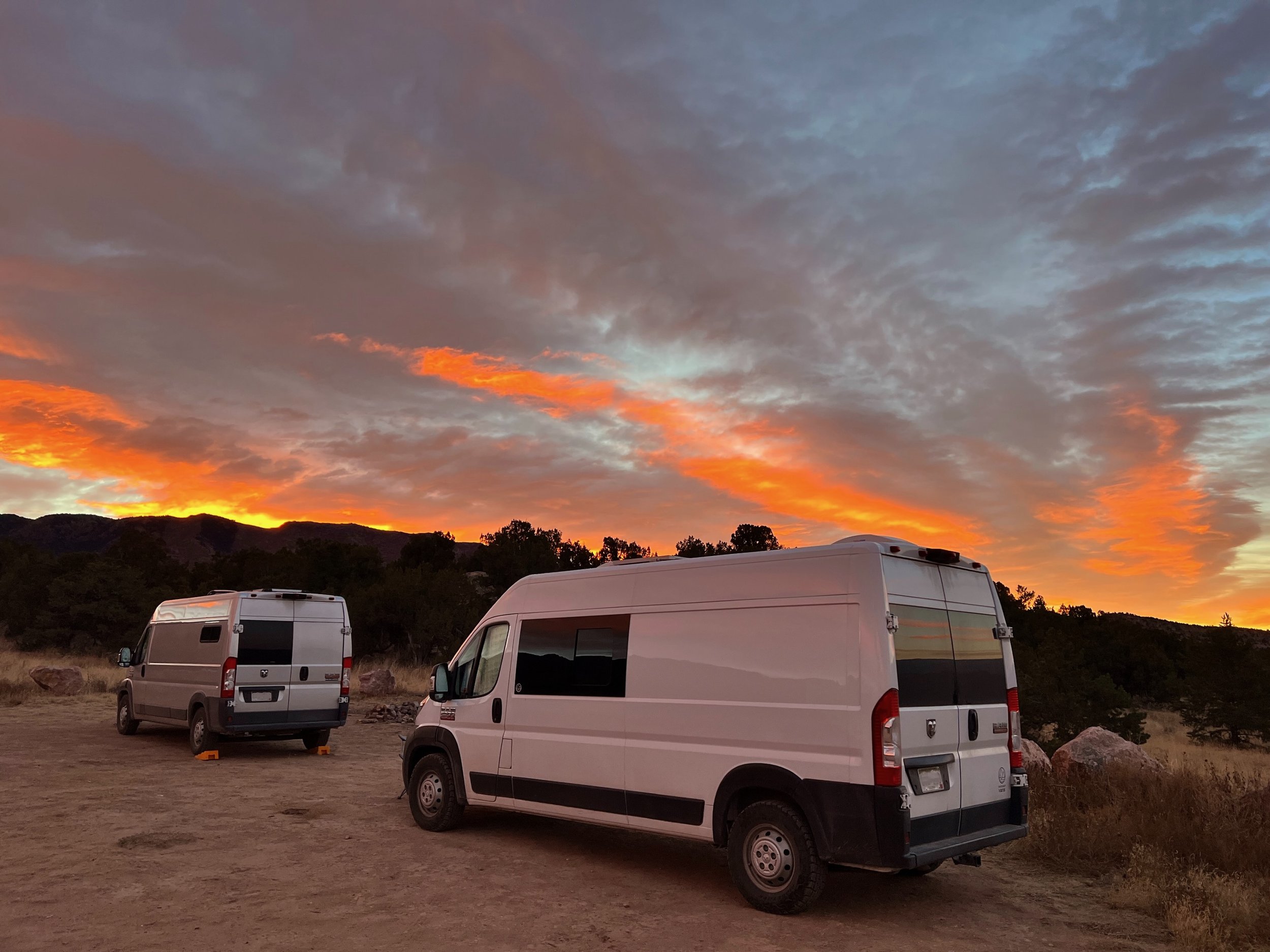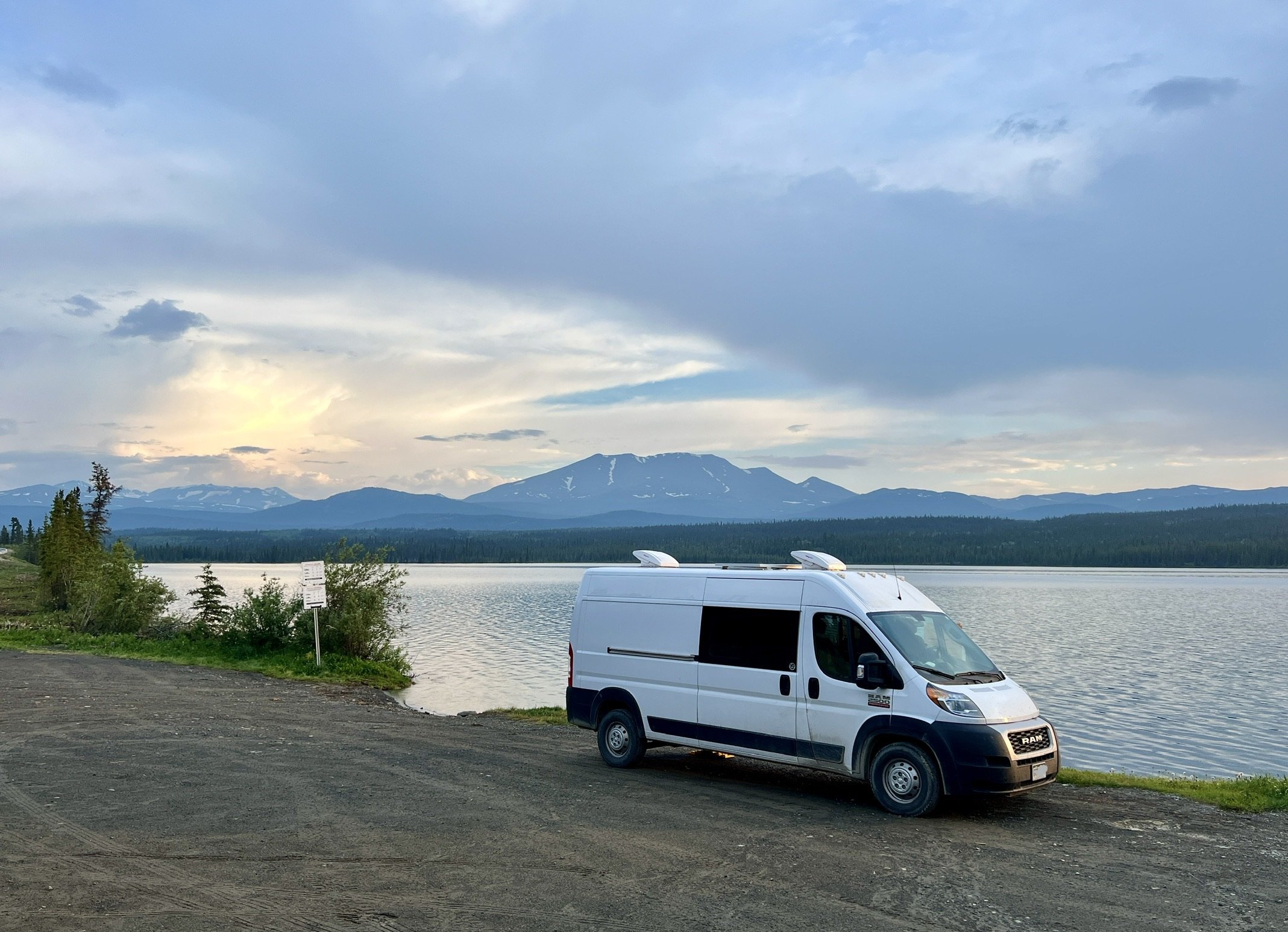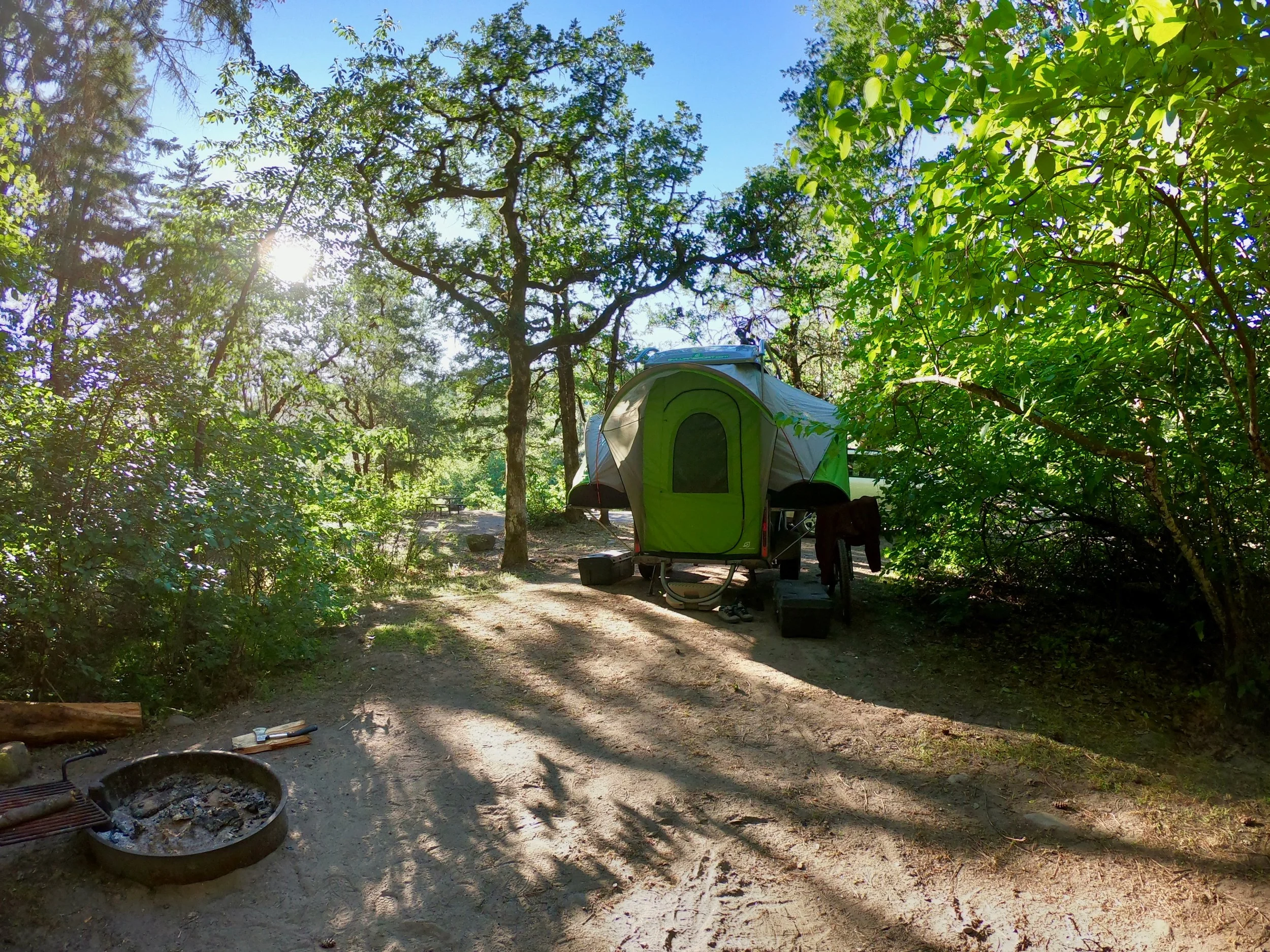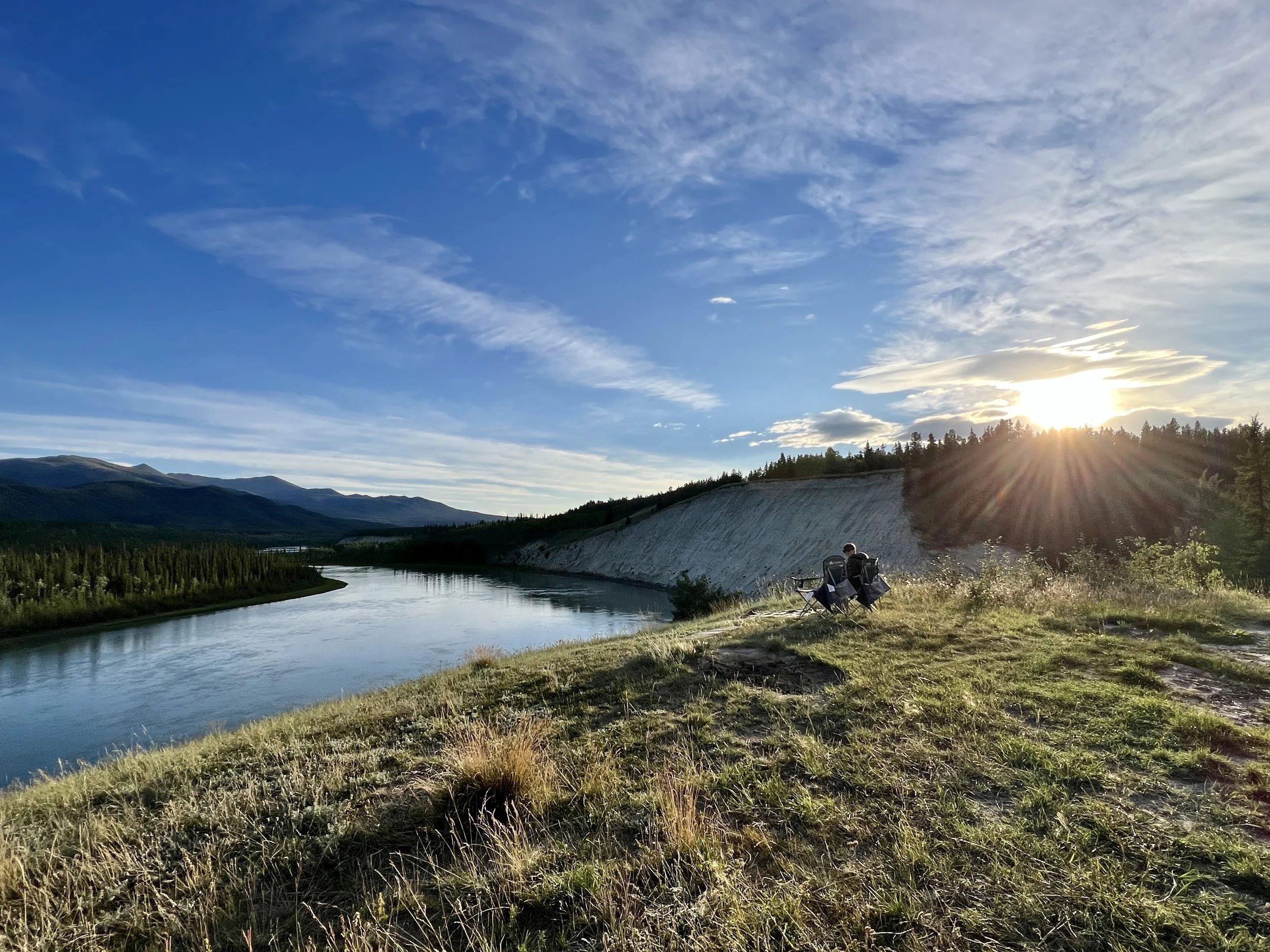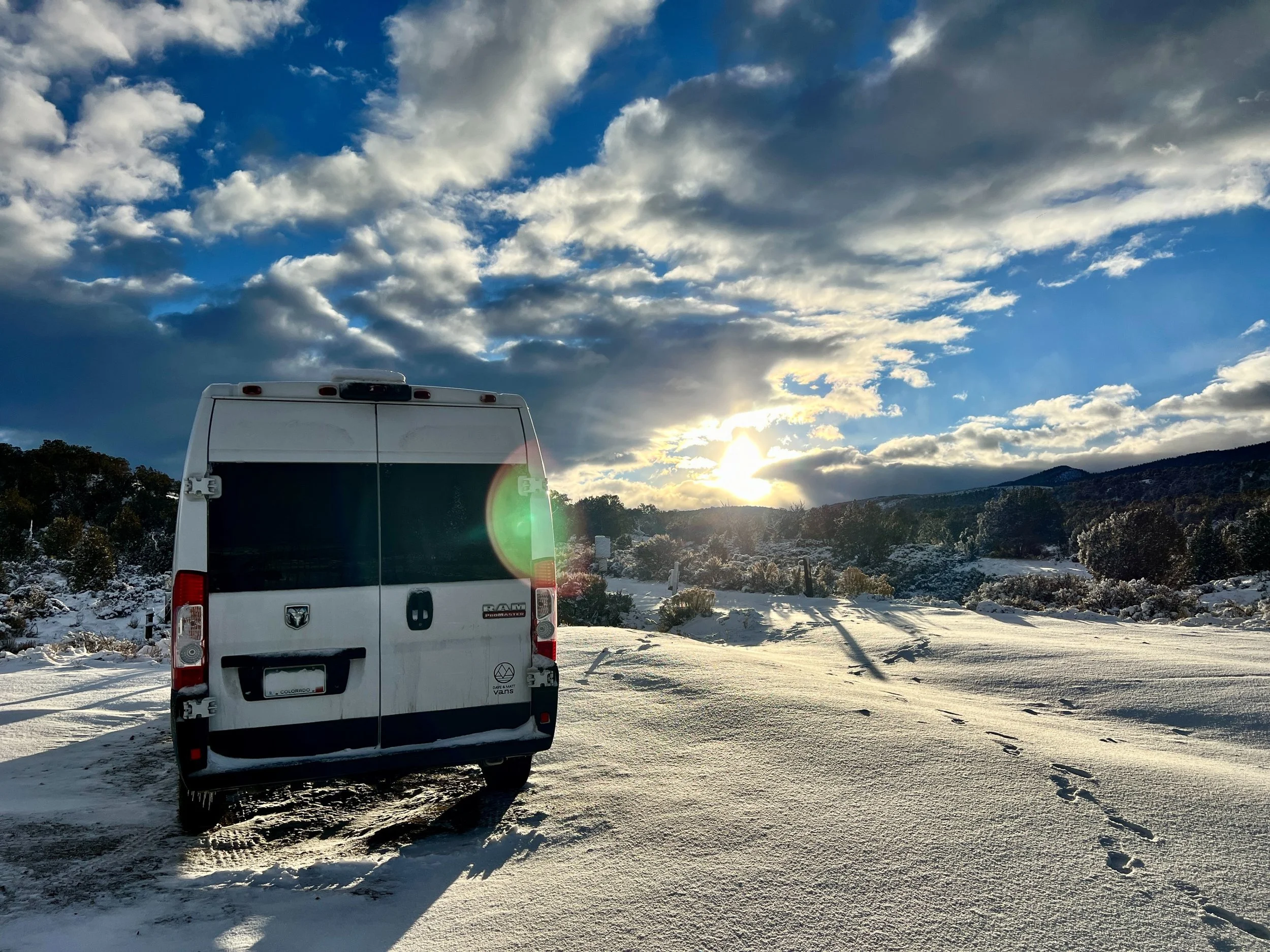Do you REALLY need to buy a camper van?
Sunrise from van camp at Oil Well Flats, Colorado
When we announced on social media that we had purchased a camper van and were embarking on full-time #vanlife, the questions immediately flooded in. "How did you go about choosing your van?" "How difficult is living in a van?" "What does a day in the life look like?" "How expensive are vans?" It was clear that vans and alternate forms of living were front and center in the minds of many outdoorsy people during the height of the 2020 pandemic.
Since then, we've driven almost 40,000 miles across North America, and we're quickly approaching our 500th night spent in the van. After gaining some perspective and experience in this lifestyle, I thought that sitting down to write an in-depth van purchasing guide, complete with both new and used van market analyzers, would be a useful project that I haven't seen anybody else tackle with any real depth.
See Also: Van Life Year 1, Van Life Year 2
But as I sat down and began to write about how to buy a camper van, I realized that there's a very real and much more pressing question that you need to ask yourself first: Do you really need to buy a camper van in the first place?
Camper vans can take you some really incredible places… but do you REALLY need to buy one?
The sad reality of American existence is that our lives are dominated and sometimes even destroyed by wanton consumerism. Many middle-class Americans make plenty of money to live vibrant, healthy, interesting lives with little stress or anxiety... yet most of us still feel crushed by stress and the pressures of life. Money routinely ranks among the most common response to surveys about stressors. In 2022, it ranked number one for the second year in a row: an incredible 32% of people say that they are stressed out about money. (Source)
If we can find something to point to and cast the blame upon, so often we heap that blame on the bills that we have to pay and how difficult it is to make ends meet. This narrative has only become more persistent in recent months due to rampant inflation.
The harsh reality is that, for middle-class Americans, if we can't pay the bills, we are ourselves mostly to blame. We lust after physical possessions that we can't afford, but we buy them anyway—just swipe the credit card, or get another loan at an exorbitant interest rate. After accumulating a fancy collection of toys complete with a camper, a couple motorcycles, a suite of mountain bikes, a boat, a side-by-side, snowmobile, pool, home entertainment system, etc. etc.... we then find ourselves drowning in debt that we can't get out of. Because none of these things are assets that increase in value or help us build more wealth—they all go down in value, meaning that we can quickly owe more on the loan than the latest and greatest toy is worth anymore.
Learn to Calculate the Total Cost of Any Purchase
Fox Lake, Yukon Territory
If you've fallen prey to this trap in the past, there are a few ways to avoid it in the future. One tactic is to get better at calculating a purchase's total cost, once you've paid the interest over the entire life of the loan, and not just what the monthly payment will be.
Let's look at one of the most popular professionally-built van models on the market: the Winnebago Revel. The Revel starts at $210,000, but of course can cost more with upgrades. If you don't have $210,000 on hand in cash and instead decide to buy the Revel on credit, you might be able to finance it with an RV loan. At the time of this writing, the best RV loan interest rates on the market are about 8%, and most of them will finance for as long as 5 years/60 months. If you put 0% down, the total cost of your Revel is actually $257,582, which includes $45,482 in interest and $2,100 in sales tax.
And what if you can't qualify for an 8% loan and instead have to pay 10%? The total cost will be over $12,000 higher with just a 2% increase in the interest rate!
To run these numbers for yourself, look up a basic RV loan calculator online, like this one. You can do the same for any major purchase, including a car or a house.
Compounding problems for van buyers, depending on the situation, you might not qualify for an auto loan or an RV loan for the van, depending on who built it. Sometimes you might be able to finance the van separately from the build, and other times not. If you have to purchase your vehicle with an unsecured personal loan, the interest rate will be even higher, and the cost will be even more.
Forecasting Additional Expenses
But wait! There's more.
Insurance alone will cost this Revel owner at least $100 per month, which is $1,200 per year, or $12,000 over the course of a decade. And according to an article on Winnebago.com, you'll also need to plan for at least $200/month in repairs and maintenance costs. That's another $24,000 over the course of a decade. More on this below...
What could you use instead?
Use the resources that you already have at your disposal.
This is why minimalism is the key that can unlock your life. If you can break the addiction to rampant consumerism and instead only buy the things that you truly need, you can break the chains that debt wraps around you and instead, live freely and happily.
So when it comes to the decision to buy a camper van, the question that you need to ask yourself is: "do I really need this camper van? Or will something else (something cheaper) serve me just fine instead?"
I recommend beginning by looking at the resources that you already have at your disposal, and asking yourself how you can use them to achieve your end goals. If your goal is to have a way to escape to the mountains on the weekends, do you really need a camper van to do that? Even if your goal is to travel around the continent, is a camper van the only way to do that?
When I first started traveling full-time, I considered buying a van right off the bat... but instead, I looked at the resources currently at my disposal and asked, "is this enough to get started?" I already had a Sylvansport GO camper in my possession that, while not nearly as comfortable or convenient as a converted camper van, proved capable enough to travel across North America for 5 months straight. It was only after that camper was stolen in California that I finally pivoted toward actual #vanlife.
There's more than one way to achieve your goals, and there are so many different rigs or outfits that are much, much cheaper than buying a new van. Do you already own a truck? Then a used truck bed camper could be dramatically cheaper and just as comfortable as a camper van. In fact, I've talked to full-time travelers that were all-in on their truck camper setup for $12,000—which includes both a used truck and a used camper! Granted, they scored fantastic deals on both, but deals can be had if you think outside the box.
Do you have a car with a roof rack on it already? A rooftop tent could be a great option. Or if you really want to get swanky, you could buy a small camper that you can tow with the vehicle that you already own. Learn to think outside the box.
How many days per year are you going to use your camper van?
There’s no denying that #vanlife opens up incredible camping opportunities, like this spot on the Takhini River in the Yukon Territory.
Let me be clear: I have absolutely nothing against buying expensive possessions that might seem like a luxury to others that you truly value and enjoy. However, I do have a problem with people who spend money on expensive possessions and then don't use them. This is a massive waste that keeps you in bondage instead of enabling your freedom.
The ultimate question, when it comes right down to it, is, "how often are you going to use this camper van?"
Most people who buy an expensive camper van aren't doing so to live in it full-time. Instead, it's simply a recreational vehicle, and as such, spends most of its time sitting in the driveway gathering pollen instead of gathering dust from a good dirt road.
While it's hard to get good data on #vanlifers as we tend to fall through the demographic cracks, I recently skimmed a detailed report about RV use (which theoretically includes camper vans as Class B RVs), that stated that the average RV owner uses their RV 30 days per year.
And that's an average. Think about all of the full-timers who spend 365 days per year in their RVs or vans and the other end of the spectrum where the RV never leaves the driveway.
Still, even at 30 days per year, do you really need to buy a camper van?
Let's be honest: we know without running the numbers that 30 days per year isn't worth it. So let's round up to a more optimistic number, shall we? I recently spoke with a van owner who had bought her van 8 months ago, and she proudly proclaimed that she was keeping track of the nights spent in her van, and had just hit 40 nights. So, she was averaging about 5 nights per month in her new van, or 60 nights per year—double the average RV owner.
Let's use this number and then take the example of a Revel. Let's be ultra-generous, and say that you buy this van, and then you somehow get off the hedonic treadmill and keep the same van and use it for a full decade. If you only use it for 60 days per year, that would be 600 days over a decade.
Ok, that sounds like a fair bit of use, but we determined that the purchase cost of the vehicle was about $257,582 after interest and taxes. On top of that, insurance and maintenance add up to an additional $3,600/year or $36,000 over the course of a decade.
If you add those numbers up and divide by 600 nights in a decade to get your cost per night, you'll find you're paying a whopping $489 per night to stay in your Revel van!
At $489 per night, you can easily stay in beautiful, swanky hotels on every night of your travels for the next decade—probably the hotels that leave a complimentary bottle of bubbly when you arrive in your room.
Can you imagine all that champagne?! That's reason enough not to buy a camper van.
Let's Be Honest with Ourselves
How committed are you?
At 5 nights per month or 60 nights per year, do you really need to buy a $257,000 camper van?
FUCK NO.
If you're only going out 5 nights per month, just buy a nice tent, sleeping pad, and sleeping bag, for maybe $800 or so. If you want to be super fancy, buy a small pull-behind camper that you can tow with the vehicle that you already own. But don't buy a $257,000 van.
However, based on the analysis above, you can see that there are two basic ways that you can make the camper van math work out:
Buy a more affordable van.
Spend more nights per year in your van.
Or ideally, do both. That's what we did.
If you think you can make both of these counter-cultural moves—avoid spending $200,000 and use your van many more nights per year than the average person—then perhaps buying a camper van is indeed for you. But you'd best be honest with yourself about how much you're really going to use this van and how much you can afford to spend, because you don't want to make a quarter-million-dollar mistake.

